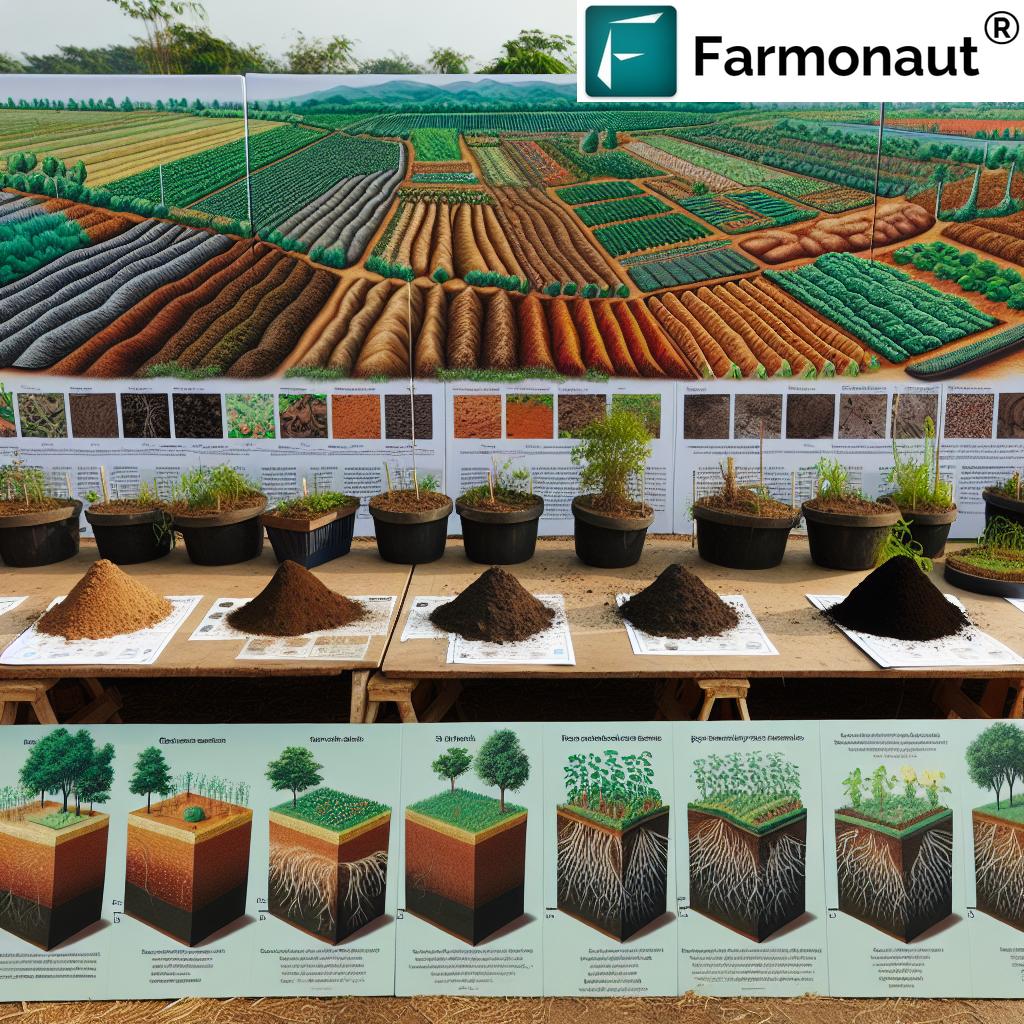Unlocking Soil Health: Native American Tribes Host Sustainable Agriculture Workshop in Lawton, Oklahoma
“The soil health workshop in Lawton, Oklahoma, united two Native American tribes: the Comanche Nation and Kiowa Tribe.”
In a groundbreaking initiative to promote sustainable agriculture practices and soil conservation techniques, the Comanche Nation and Kiowa Tribe recently joined forces to host a remarkable “Soil Health Workshop” in Lawton, Oklahoma. This event, held at the Great Plains Technology Center, brought together farmers, ranchers, and agricultural enthusiasts from across the region to explore innovative methods for improving soil fertility while reducing reliance on fertilizers and chemicals.
As we delve into the details of this transformative workshop, we’ll uncover the wealth of knowledge shared, the eco-friendly farming approaches discussed, and the profound impact this collaborative effort is set to have on the future of agriculture in the area. Join us as we explore how these Native American tribes are leading the way in combining traditional wisdom with modern regenerative agriculture principles to create more productive and resilient agricultural systems.
The Significance of Soil Health in Sustainable Agriculture
Before we dive into the specifics of the workshop, it’s crucial to understand why soil health is at the forefront of sustainable agriculture practices. Healthy soil is the foundation of a thriving ecosystem, playing a vital role in:
- Nutrient cycling and retention
- Water filtration and storage
- Carbon sequestration
- Erosion prevention
- Supporting biodiversity
By focusing on soil health, farmers and ranchers can create more resilient and productive agricultural systems that require fewer inputs and are better equipped to withstand environmental stresses.
At Farmonaut, we recognize the critical importance of soil health in sustainable agriculture. Our satellite-based crop health monitoring technology provides farmers with valuable insights into soil moisture levels and vegetation health, enabling them to make informed decisions about irrigation and fertilizer usage. This data-driven approach aligns perfectly with the goals of the soil health workshop, promoting more efficient and eco-friendly farming practices.

The Soil Health Workshop: A Collaborative Effort
The soil health workshop in Lawton, Oklahoma, was a testament to the power of collaboration between Native American tribes. The Comanche Nation and Kiowa Tribe came together to share their collective knowledge and expertise in sustainable land management practices. This joint effort not only highlighted the importance of soil health but also showcased the growing interest in organic farming tips and the benefits of healthy soil for both small-scale and large-scale operations.
“The sustainable agriculture event was held at the Great Plains Technology Center, focusing on eco-friendly farming approaches.”
The choice of venue, the Great Plains Technology Center, was particularly fitting for this event. It provided an ideal setting for combining traditional wisdom with modern agricultural technology, much like how Farmonaut integrates innovative satellite technology with time-honored farming practices.
Key Topics Covered in the Workshop
The soil health workshop covered a wide range of topics, all centered around the theme of sustainable agriculture practices and natural farming methods. Some of the key areas discussed included:
- Soil conservation techniques
- Organic farming tips
- Regenerative agriculture principles
- Native American agricultural traditions
- Soil fertility improvement strategies
- Eco-friendly farming approaches
- The benefits of healthy soil for crop productivity
One of the workshop’s highlights was a presentation by Soil Health Specialist and Rancher, Ray Archuleta. He emphasized the interconnectedness of soil health, plant health, animal health, human health, and climate health. This holistic approach resonates strongly with the principles behind Farmonaut’s Jeevn AI Advisory System, which provides personalized farm advisory based on a comprehensive analysis of various agricultural factors.
Innovative Soil Conservation Techniques
During the workshop, attendees were introduced to a variety of innovative soil conservation techniques designed to improve soil health while reducing the need for chemical inputs. Some of these techniques included:
- Cover Cropping: Planting specific crops to cover and protect the soil during off-seasons, improving soil structure and fertility.
- No-Till Farming: Minimizing soil disturbance to preserve soil structure and beneficial microorganisms.
- Crop Rotation: Alternating crops to improve soil health, break pest cycles, and optimize nutrient use.
- Composting: Creating nutrient-rich organic matter to enhance soil fertility naturally.
- Integrated Pest Management: Using biological controls and targeted interventions to manage pests without relying heavily on chemicals.
These techniques align well with Farmonaut’s mission to promote sustainable agriculture. Our carbon footprinting tool can help farmers track the impact of these conservation practices on their overall carbon emissions, providing valuable data for environmental compliance and sustainability initiatives.
Native American Agricultural Wisdom
A significant portion of the workshop was dedicated to exploring Native American agricultural traditions and how they can be integrated with modern sustainable farming practices. The Comanche Nation and Kiowa Tribe shared insights into their ancestral farming methods, which often prioritized working in harmony with nature. Some key principles discussed included:
- Companion planting for natural pest control
- Water conservation techniques
- Use of native plant species
- Holistic land management practices
- Seasonal planting based on natural cycles
These traditional practices offer valuable lessons for modern agriculture, emphasizing the importance of biodiversity and ecological balance. At Farmonaut, we recognize the value of combining traditional wisdom with cutting-edge technology. Our satellite-based monitoring system can help farmers implement these time-honored practices more effectively by providing real-time data on crop health and environmental conditions.

Regenerative Agriculture: A Path to Sustainable Farming
The workshop placed a strong emphasis on regenerative agriculture principles, which focus on rehabilitating and enhancing the entire farm ecosystem. This approach goes beyond sustainable agriculture by actively improving natural resources, rather than simply maintaining them. Key aspects of regenerative agriculture discussed at the workshop included:
- Minimizing soil disturbance
- Maximizing crop diversity
- Keeping soil covered
- Maintaining living roots in the soil year-round
- Integrating livestock into cropping systems
These practices not only improve soil health but also increase biodiversity, enhance ecosystem services, and contribute to climate change mitigation through carbon sequestration. Farmonaut’s technology can play a crucial role in implementing regenerative agriculture practices. Our satellite-based crop monitoring can help farmers track the progress of their regenerative efforts, providing valuable data on vegetation health, soil moisture, and overall ecosystem improvements.
Soil Fertility Improvement: Natural Methods
One of the key focuses of the workshop was on natural methods for improving soil fertility. Attendees learned about various techniques to enhance soil health without relying heavily on synthetic fertilizers. Some of the methods discussed included:
- Green Manures: Growing and plowing under cover crops to add organic matter and nutrients to the soil.
- Vermicomposting: Using earthworms to create nutrient-rich compost.
- Biochar Application: Incorporating charcoal-like substances to improve soil structure and nutrient retention.
- Crop Residue Management: Leaving crop residues on the field to decompose and enrich the soil.
- Microbial Inoculants: Introducing beneficial microorganisms to enhance soil biology.
These natural fertility improvement methods align perfectly with Farmonaut’s mission to promote sustainable agriculture. Our AI-driven advisory system can help farmers determine the most effective combination of these techniques for their specific soil conditions and crop requirements.
Eco-Friendly Pest Management Strategies
The workshop also addressed the critical issue of pest management in sustainable agriculture. Attendees learned about various eco-friendly approaches to control pests without resorting to harmful chemicals. Some of the strategies discussed included:
- Biological pest control using natural predators
- Trap cropping to lure pests away from main crops
- Use of pheromone traps for pest monitoring
- Planting pest-repellent companion crops
- Implementing crop rotation to break pest cycles
These eco-friendly pest management techniques not only protect the environment but also contribute to overall soil health by reducing chemical inputs. Farmonaut’s technology can assist farmers in implementing these strategies more effectively. Our satellite-based crop health monitoring can help detect early signs of pest infestations, allowing for timely and targeted interventions using these natural methods.
Water Conservation in Sustainable Agriculture
Water conservation was another crucial topic addressed during the soil health workshop. With increasing concerns about water scarcity and the impact of climate change on water resources, attendees learned about various techniques to optimize water use in agriculture. Some of the methods discussed included:
- Drip Irrigation: Using targeted water delivery systems to reduce water waste.
- Mulching: Applying organic materials to the soil surface to retain moisture.
- Rainwater Harvesting: Collecting and storing rainwater for agricultural use.
- Keyline Design: Employing landscape design techniques to maximize water retention.
- Drought-Resistant Crop Selection: Choosing plant varieties that require less water.
Farmonaut’s technology can play a significant role in implementing these water conservation strategies. Our satellite-based soil moisture monitoring can help farmers make informed decisions about irrigation timing and volume, ensuring optimal water use efficiency.
The Role of Technology in Sustainable Agriculture
While the workshop focused heavily on traditional and natural farming methods, it also acknowledged the important role that modern technology can play in sustainable agriculture. Precision farming tools, like those offered by Farmonaut, can help farmers implement sustainable practices more effectively by providing data-driven insights.
Some of the technological applications discussed in the context of sustainable agriculture included:
- Satellite-based crop monitoring for precise resource management
- AI-driven advisory systems for personalized farming recommendations
- IoT sensors for real-time soil and crop health monitoring
- Blockchain technology for improving supply chain transparency
- Drones for targeted pest management and crop assessment
Farmonaut’s suite of tools aligns perfectly with these technological applications. Our satellite-based farm management solutions provide farmers with real-time data on crop health, soil moisture, and other critical metrics, enabling them to make informed decisions that optimize resource use and minimize environmental impact.
The Benefits of Healthy Soil: A Comprehensive Overview
Throughout the workshop, the numerous benefits of maintaining healthy soil were emphasized. Attendees learned how improving soil health can lead to a cascade of positive effects throughout the entire agricultural ecosystem. Some of the key benefits discussed included:
- Increased crop yields and quality
- Enhanced water retention and drought resistance
- Improved nutrient cycling and availability
- Reduced need for chemical inputs
- Greater resilience to pests and diseases
- Increased carbon sequestration potential
- Enhanced biodiversity both above and below ground
These benefits underscore the importance of prioritizing soil health in agricultural practices. Farmonaut’s technology can help farmers track and quantify these improvements over time. Our AI-driven analytics can provide insights into how changes in soil health correlate with improvements in crop performance and overall farm productivity.
Sustainable Agriculture Practices Comparison
| Agricultural Practice | Traditional Method | Sustainable Alternative | Estimated Improvement |
|---|---|---|---|
| Soil Fertility Management | Chemical Fertilizers | Cover Cropping | 30% increase in soil organic matter |
| Pest Control | Synthetic Pesticides | Integrated Pest Management | 50% reduction in pesticide use |
| Tillage | Conventional Tillage | No-Till or Reduced Tillage | 60% decrease in soil erosion |
| Water Management | Flood Irrigation | Drip Irrigation | 40% reduction in water usage |
| Crop Diversity | Monoculture | Crop Rotation and Intercropping | 25% increase in overall yield |
Implementing Sustainable Practices: Challenges and Solutions
While the benefits of sustainable agriculture practices are clear, the workshop also addressed the challenges farmers may face when transitioning to these methods. Some of the common challenges discussed included:
- Initial costs of implementing new practices
- Learning curve associated with new techniques
- Potential short-term yield reductions during transition
- Market pressures favoring conventional practices
- Lack of supportive policies or incentives
To address these challenges, the workshop offered several solutions and resources:
- Access to educational resources and training programs
- Networking opportunities with experienced practitioners
- Information on government programs supporting sustainable agriculture
- Guidance on marketing sustainable products for premium prices
- Tools for monitoring and quantifying the benefits of sustainable practices
Farmonaut’s technology can play a crucial role in overcoming these challenges. Our data-driven insights can help farmers track the progress of their sustainable practices, providing tangible evidence of improvements in soil health and crop productivity. This data can be invaluable for securing financial support, accessing sustainability-focused markets, and demonstrating compliance with environmental regulations.
The Future of Sustainable Agriculture in Oklahoma
The soil health workshop in Lawton, Oklahoma, represents a significant step towards a more sustainable agricultural future for the region. By bringing together Native American agricultural wisdom, modern sustainable farming techniques, and cutting-edge technology, the event has set the stage for a transformation in how farming is practiced in the area.
As more farmers and ranchers adopt these sustainable practices, we can expect to see:
- Improved soil health across the region
- Increased resilience to climate change impacts
- Reduced environmental impact of agricultural activities
- Enhanced biodiversity in agricultural landscapes
- Greater food security and economic stability for farming communities
Farmonaut is committed to supporting this transition to sustainable agriculture. Our satellite-based farm management solutions and AI-driven advisory systems are designed to help farmers implement and optimize sustainable practices, ensuring a healthier, more productive agricultural future for Oklahoma and beyond.
Conclusion: A New Era of Sustainable Farming
The soil health workshop hosted by the Comanche Nation and Kiowa Tribe in Lawton, Oklahoma, marks the beginning of a new era in sustainable agriculture for the region. By combining traditional wisdom, modern scientific understanding, and innovative technology, farmers and ranchers now have the tools and knowledge to create more resilient, productive, and environmentally friendly agricultural systems.
As we move forward, it’s clear that the future of farming lies in working harmoniously with nature, prioritizing soil health, and embracing sustainable practices. With the support of technologies like those offered by Farmonaut, farmers can make data-driven decisions that not only improve their yields and profitability but also contribute to the health of our planet.
We encourage all farmers, ranchers, and agricultural enthusiasts to explore the sustainable agriculture practices discussed in this workshop and consider how they can be implemented in their own operations. Together, we can create a more sustainable and prosperous future for agriculture in Oklahoma and beyond.
FAQ Section
Q: What were the main topics covered in the soil health workshop?
A: The workshop covered a range of topics including soil conservation techniques, organic farming tips, regenerative agriculture principles, Native American agricultural traditions, soil fertility improvement strategies, and eco-friendly pest management.
Q: How can farmers benefit from implementing sustainable agriculture practices?
A: Farmers can benefit through increased crop yields, improved soil health, reduced input costs, enhanced resilience to climate change, and potential access to premium markets for sustainably produced goods.
Q: What role does technology play in sustainable agriculture?
A: Technology, such as Farmonaut’s satellite-based monitoring systems, plays a crucial role by providing real-time data on crop health, soil moisture, and other critical metrics, enabling farmers to make informed decisions that optimize resource use and minimize environmental impact.
Q: How can Native American agricultural traditions contribute to modern sustainable farming?
A: Native American agricultural traditions often emphasize working in harmony with nature, using companion planting, water conservation techniques, and holistic land management practices that can be integrated with modern sustainable farming methods for improved ecological balance.
Q: What are some challenges farmers might face when transitioning to sustainable practices?
A: Challenges may include initial implementation costs, a learning curve for new techniques, potential short-term yield reductions during transition, market pressures favoring conventional practices, and a lack of supportive policies or incentives.
Earn With Farmonaut
Earn 20% recurring commission with Farmonaut’s affiliate program by sharing your promo code and helping farmers save 10%. Onboard 10 Elite farmers monthly to earn a minimum of $148,000 annually—start now and grow your income!
To learn more about our affiliate program and start earning, visit Farmonaut’s Affiliate Program.
Access Farmonaut’s Tools
Ready to take your farming to the next level with sustainable, data-driven practices? Access Farmonaut’s suite of tools:
For developers interested in integrating Farmonaut’s powerful satellite and weather data into their own applications, check out our API and API Developer Docs.

















Pretty nice post. I just stumbled upon your blog and wanted to say that I’ve truly loved browsing your weblog posts. After all I will be subscribing for your rss feed and I hope you write again very soon!